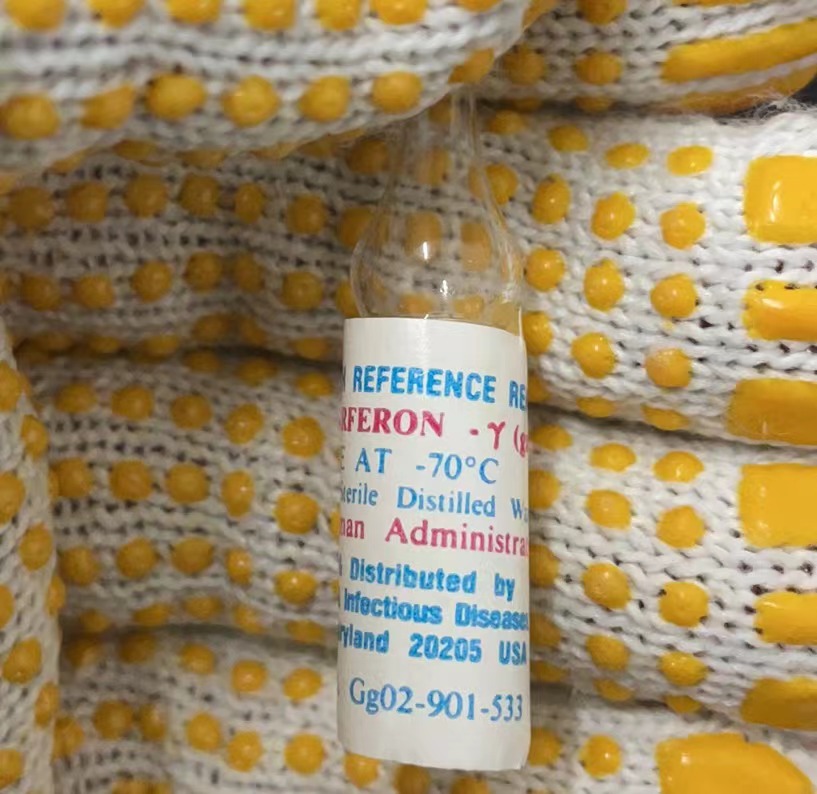产品图片

货号/SKU
NR-19635
货号/规格
EA
库存与交货期
3-8周
人民币价格
14000
试剂海关审批
A/B级风险物质只能直接使用人购买并持有实验室有效资质,其它询客服确认
国外采购
支持/部分限制一年内购买数量
厂牌
BEI Resources(ATCC)
产品基础信息
生物安全等级建议分类:美国、1
产品描述信息
NR-19635?? Yersinia pestis, Strain KIM, Gateway? Clone Set, Recombinant in Escherichia coli, Plate 39(Clones)|Yersinia pestis|Yersinia pestis, Strain KIM, Gateway? Clone Set, Recombinant in Escherichia coli, Plate 39|-80°C or colder|Pathogen Functional Genomics Resource Center at the J. Craig Venter InstituteAcknowledgment for publications should read "The following reagent was obtained through BEI Resources, NIAID, NIH: Yersinia pestis, Strain KIM, Gateway? Clone Set, Recombinant in Escherichia coli, Plate 39, NR-19635"|Quantity limit per order for this item is 1. This item can be ordered twice a year. Orders over this limit will be sent to NIAID for approval before shipment.The Yersinia pestis (Y. pestis), strain KIM, Gateway? clone set consists of 43 plates (plate 2 of this clone set has been discontinued) which contain more than 3600 sequence validated clones from Y. pestis, strain KIM cloned in Escherichia coli (E. coli) DH10B-T1 cells. Each open reading frame was constructed in vector pDONR?221 (Invitrogen?) with an ATG start codon and a TAG stop codon. The sequence was validated by full length sequencing of each clone with greater than 1X coverage and a mutation rate of less than 0.2%. Information related to the use of Gateway? Clones can be obtained from Invitrogen?. Recombination was facilitated through an attB substrate (attB-PCR product or a linearized attB expression clone) with an attP substrate (pDONR?221) to create an attL-containing entry clone. The entry clone contains recombinational cloning sites, attL1 and attL2 to facilitate gene transfer into a destination vector, M13 forward and reverse priming sites for sequencing and a kanamycin resistance gene for selection. Please refer to the Invitrogen? Gateway? Technology Manual for additional details.Each inoculated well of the 96-well plate contains approximately 60 ?L of E. coli culture (strain DH10B-T1) in Luria Bertani (LB) Broth containing 50 ?g/mL kanamycin supplemented with 15% glycerol.Note: Production in the 96-well format has increased risk of cross-contamination between adjacent wells. Individual clones should be purified (e.g. single colony isolation and purification using good microbiological practices) and sequence-verified prior to use. BEI Resources cannot confirm or validate any clone not identified on the plate information table found on the Product Information Sheet.
主要内容
此项目的每个订单数量限制为1.此商品每年可订购两次.此限制的订单将在发货前发送到NIAID进行批准. yersinia pestis(y.pestis),应变金,网关?克隆组由43个板(已停止该克隆集的板2),其包含来自 y的3600多个序列验证的克隆. Pestis ,菌株Kim在大肠杆菌中克隆( e.coli )dh10b-t1细胞.每个开放阅读框架以Vector pdonr?221 (Invitrogen?)用ATG起始密码子和标签停止密码子.通过大于1x覆盖率的每个克隆的全长测序验证序列,突变率小于0.2%. 与使用网关?克隆有关的信息可以从 Invitrogen ?.通过 att b底板( att b-pCR产物或线性化的 att b表达克隆)促进重组,用 att P衬底(PDONR?221)以产生含有含有ATT L的入口克隆.进入克隆含有重组克隆位点, att l1和 att L2,以促进基因转移到目的载体中,用于测序和卡那霉素抗性基因的目的载体,M13向前和逆向引发位点选择.请参阅Invitrogen?网关?技术手册更多详情. 96孔板的每个接种孔含有大约60μl的 e. Coli 培养(菌株DH10B-T1)在含有50μg/ mL卡那霉素的LURIA Bertani(LB)肉汤中补充有15%甘油的肉类. 注意:生产96孔格式增加了相邻井之间的交叉污染的风险.应纯化各个克隆(例如,使用良好的微生物实践的单菌落分离和纯化)并在使用前进行序列验证. Bei Resources无法确认或验证产品信息表上的板信息表上未识别的任何克隆.
厂牌介绍
BEI Resources 由美国国家过敏和传染病研究所 ( NIAID )成立,旨在为研究 A、B 和 C 类优先病原体、新兴传染病病原体、非病原微生物和其他相关微生物材料提供试剂、工具和信息到研究界。BEI Resources 获取、验证和生产科学家进行基础研究和开发改进的诊断测试、疫苗和疗法所需的试剂。通过将这些功能集中在 BEI Resources 中,可以监控科学界对这些材料的访问和使用,并确保试剂的质量控制。
除了为传染病界提供材料外,BEI Resources 还鼓励和支持研究人员和机构的材料存放。使用 BEI Resources存放材料对研究人员和研究社区有许多优势,包括安全存储、社区访问和分发;同时保护存款人的知识产权。只要有需要,BEI 资源库将作为研究人员的资源进行维护。您在 BEI Resources 的存款是一项有助于未来研究的长期投资。
BEI Resources 自 2003 年起由美国典型培养物保藏中心 (ATCC) 根据合同管理。2016 年 5 月, ATCC获得了一份为期七年的继续管理 BEI Resources的合同。合同范围已扩大到更全面的研究目录材料,包括由其他政府支持的研究项目存放的材料,将提供给生物防御和新兴传染病科学界。真菌、寄生虫、载体和其他相关材料已添加到现有的细菌、病毒和毒素试剂中,涵盖 NIAID A、B 和 C 类优先病原体和 NIAID 指定的新发传染病病原体和生物。
品牌标识

可能感兴趣的内容
2025-02-12
2022-04-01
2021-12-21
2021-12-02
2025-01-08
2021-12-21
2024-05-19
2024-01-21
2021-12-02
2019-05-08
2021-12-21
2025-04-06
2019-05-08
2022-04-01
2021-12-21
